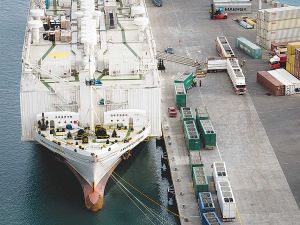NZ Catchment Groups Thrive with ‘Source to Sea’ Approach
The most successful catchment groups in NZ are those that have 'a source to sea' approach.
 Some 40,000 cattle have been exported this year with another 28,000 planned to go in the months ahead.
Some 40,000 cattle have been exported this year with another 28,000 planned to go in the months ahead.
OPINION: The decision by Ministry for Primary Industries (MPI) to impose an immediate halt to live animal exports in the wake the sinking of the Gulf Livestock 1 off the coast of Japan is a sensible move.
One would hope this is properly used as a pragmatic opportunity to review what exactly happened in this tragic case. It should not be used as some covert move to end this valuable export trade to appease overly excited animal activists and get this issue off the political agenda.
The ship left Napier on August with 43 crew including two New Zealanders and 6000 cattle bound for China. As Rural News went to press, still only two survivors and one dead crew member from the ship had been found. Let’s not forget, 40 people are still missing.
MPI says it wants to be assured that before there are any decisions about another shipment that it knows what took place on the Gulf Livestock 1 in more detail. That is not only sensible, but the right thing to. The sinking of the ship and the loss of the crew is tragic.
But this shouldn’t be used as some underhand tactic to end the trade of live animals for export. It is a lucrative, safe and important market for NZ.
Claims about high death rates and terrible conditions on board made by animal activists are not borne out by the facts. The cattle on these ships are well looked after on their voyage, fed high-quality feed and given veterinary supervision. The mortality rate is around 0.1%, which is no higher than the death rate if they stayed in NZ. These cattle are sent for breeding purposes, not slaughter and would most likely have been killed as bobby calves in NZ if they had not been sent for export.
This year alone, some 40,000 cattle have been exported with another 28,000 planned to go in the months ahead. The price of $1,400 a heifer is almost double what the same beast would make in NZ.
Yes, we need to ensure that any live exports from NZ meet the highest animal welfare and human safety conditions.
However, we must not allow the emotion of this tragic event or political activism over-rule a lawful, ethical, safe and financially viable option for the NZ livestock sector.
Voting has started for the renewal of DairyNZ's milksolids levy.
The most successful catchment groups in NZ are those that have 'a source to sea' approach.
Associate Agriculture Minister and Manawatu dairy farmer Andrew Hoggard says the free trade agreement (FTA) negotiated with India is not a bad deal and his party, Act, will support it when it goes before Parliament.
Newly released data from Environment Canterbury (ECan) Farm Environment Plan (FEP) audits are showing a dramatic lift in environmental performance across the region.
A solid recovery of global dairy prices this year makes a $9.50/kgMS milk price almost a shoo-in for this season.
As New Zealand marks the United Nations’ International Year of the Woman Farmer 2026 (IYWF 2026), industry leaders are challenging the misconception that women only support farming.

OPINION: Here w go: the election date is set for November 7 and the politicians are out of the gate…
OPINION: ECan data was released a few days ago showing Canterbury farmers have made “giant strides on environmental performance”.